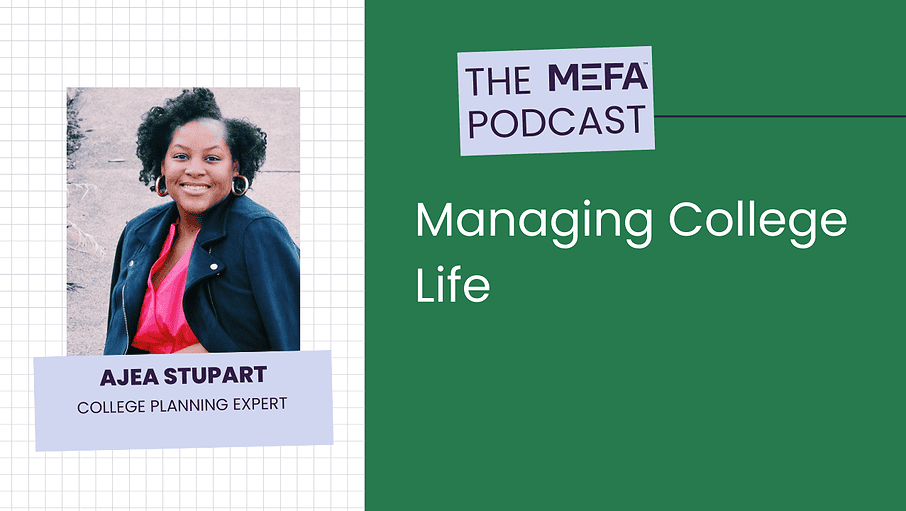

Resources Mentioned in the Episode
Jonthan Hughes: [00:00:00] Hi everyone and welcome to the MEFA podcast. My name is Jonathan Hughes
Julie Shields-Rutyna: And I’m Julie Shields-Rutyna.
Jonthan Hughes: And we have a great show for you today. Students are arriving on campus and we have on our show and I’m very happy to get to talk to her Ajea Stuppart, MEFA Pathway’s Program Coordinator and she’s going to go over some tips on managing college life. So this is for students who are just beginning college. The ones that I mentioned are arriving on campus, or if you’re beginning classes as a commuter in the next few weeks, Ajea is going to be here to break down some tips of managing the transition from being a high school student to being a college student.
And she’s a great person to do this because not only is she the most recently removed herself from this experience. So, you know, she’s the youngest of us basically.[00:01:00] But she wrote a few great blog posts on this very subject that we will as always post in the show notes if you want to go over and, and take a look at those, but stick around for that, you’ll definitely be glad that you did.
Although Julie, now that I think about it, I may have just misspoken because I said Ajea was the, the person least removed from this experience. But you, as a parent, I feel like have the, had this experience pretty recently yourself, right?
Julie Shields-Rutyna: I did. So my youngest daughter is going to be a Senior this Fall. So it seems like just yesterday that I was dropping her off at college for the first time.
Jonthan Hughes: So, I guess that, that brings up a good question. Now a is going to talk about this from the student perspective, right? Managing this transition, but I guess, you know, it’s worth it to, ask you, do you have any advice or can you talk at all about your experience of this event as a parent? [00:02:00]
Julie Shields-Rutyna: Yeah, I guess, I guess what I’d say is to just acknowledge if you haven’t done that already as a parent, that this is a big deal, it’s a huge deal on so many levels, sending your student off to college, whether they’re going down the street or they’re going very far away, things are going to change your relationship with them is going to change a little bit. They’re going to become more independent. Hopefully they’re going to become much more independent and hopefully they’ve already been kind of moving in that direction. So, there’s so many things, you know, that will happen on an individual basis. But I guess the one thing I would just talk about is that just to recognize that and to recognize that it may feel difficult, and that inevitably a day, three days a week, a month into the school year, you’ll probably get a panicked call at some point could be something like, I need a fan for my room it’s too hot in [00:03:00] here or something even more major. And just to not panic with your student to remain calm, be super supportive, but not feel like you have to jump, dive in and fix everything. You know, I think that every in every way that you can help your student advocate for themselves and allow them to feel that they really are independent and support them, maybe make a suggestion or ask a question about who they would need to talk to on campus to make something happen. But I think the key is just, recognizing it’s different. You want your student to be learning to be independent and so try to help them with that and not try to jump in with every phone call and one last thing, what I’ve found, and I’ve found this from a lot of friends have told me this too, that if a student, if your child calls you with a problem, then they hang up and you are all worried about it and they probably [00:04:00] then go down the hall and meet a friend and, you know, go out and play Frisbee or something , you know, so, just take it all with a grain of salt and recognize that it will be challenging, but it’s you’ll, you’ll be great.
Jonthan Hughes: You know, students have their things that they’re worried about and parents have their things that they’re more worried about with this process. So I thought we would take before we spoke to Ajea, a few minutes to address the parents of these students who are headed to college in a few weeks, particularly the parents who maybe haven’t figured out finances yet, you know, and they may be worried that they’re behind at this point in the year that maybe they’ve been thinking all Summer about how they’re going to do this and maybe had a little bit of, of anxiety about it.
And now maybe the payment due date is coming up really soon, and they’re getting nervous. So I know that we’ve been hearing questions from these parents on the phones over the past few days and few weeks. So let’s address some of these questions right now. So first of all, for the families [00:05:00] who are looking to make a payment and have a payment due date that they’re staring down and they have some savings to pay the bill. And you can talk about some of the MEFA programs that they may be, saving in. How do they go ahead and, and get the money that they have saved in either the UPlan or the UFund to their colleges?
Julie Shields-Rutyna: Sure. Yeah. Okay. So we know MEFA offers loans and we also offer the state’s two college savings plans. So we have specifically the UFund, which is the Massachusetts 529 and then we have the UPlan, which is the Prepaid Tuition Program. So I’ll, I’ll talk about those first. So if you’ve been saving in either one of these programs, and you want to use the funds to pay for college, which is great, because you’ve saved for that. It’s pretty easy to do that. So the UFund, the 529 Plan the way you would do that is you would contact Fidelity [00:06:00] Investments and you can do that either by calling the 1-800 number, which is 800-544-2776. And I’m sure you’ll put that in the notes, Jonathan or you can go to fidelity.com/ufund, and you can request a distribution that way.
So either way, and then you will say whether you would like it, the distribution to be sent to the college or directly to you, and then Fidelity. Send the amount that you choose to wherever you choose.
Jonthan Hughes: Okay. So that’s the UFund. What about the UPlan?
Julie Shields-Rutyna: And then the U plan, you should visit mefa.org and click through to the UPlan. Or again, you can call an 800 number 888-590-5653 and you can process your request over the phone and you can have the funds cashed [00:07:00] out to the owner or sent to the college. If the student is attending a particular college that is participating in the UPlan.
Jonthan Hughes: Yeah. So let’s talk about that a little bit. Now you mentioned for the U fund and the U plan, you can cash funds out to the owner or send them to the college does it matter where you send the funds?
Julie Shields-Rutyna: Well for the UFund, the 529 plan no, the key is you just want to make sure the funds are used for qualified educational expenses, in order for the distribution to remain totally tax free. So it may be easier to show that in an IRS audit, should that ever come up If you have the funds sent directly to the college, but it doesn’t have to, as if you have them just sent to you, just make sure that you document and keep receipts of how you spent the money on anything like tuition fees, room and board books, supplies, equipment, keep those receipts in the tax folder for the current, calendar year. [00:08:00] And then if anything ever comes up with the IRS, you can show that they, the money was spent on qualified expenses. And then won’t have to pay taxes. For the UPlan, it matters a little more. So if your child is attending a participating college in the UPlan it means that you’ve locked in a percentage of tuition and fees at those participating colleges. When you put the funds in and now you’re owed that same percentage of tuition at that college. In the maturity year. So if you cash out to the owner, you get what you put in plus interest, but not the percentage of tuition. So if the student is going to a participating college, have the money sent to the college, if they’re going to another college, then just, you can have it sent to you.
Jonthan Hughes: Okay. Now that’s great. That’s the savings programs. But when we’re thinking about parents who are maybe in a panic or, maybe just a little nervous, who are calling us, trying to figure out how they can get the bill paid. They’re mostly talking [00:09:00] about borrowing, right? So turning to parents who are looking to borrow a MEFA loan, the first thing that people want to know is how long does it take.
Julie Shields-Rutyna: Yes. And I, I, I think here at MEFA, we all use the general guidance that you should leave about two weeks for the whole process to play out. So you’ll receive your college bill you’ll know the date it’s due and try to, to apply for the loan a good two weeks in advance. And so what happens is you apply for the loan that takes about 15 minutes to fill out the application and once you submit you get a decision on if it was approved or not pretty quickly. And then everyone who’s on the loan note has to sign the loan agreements. So that can just take, you know, a day or two sometimes to make sure you sit down and do that. Then once that happens, the college is notified electronically that the student has been approved. And the [00:10:00] college has to certify that the student plans to attend. So there’s just that little bit of a process and then the money can be dispersed. So sometimes it can take a shorter time than two weeks, but I think it’s good just to allow that extra time so that no one’s in a panic so that this process can be really.
Jonthan Hughes: The college is notified pretty quickly of the decision, right? And can you talk about why that may matter to parents?
Julie Shields-Rutyna: Yeah. Well, let’s say you are doing this last minute because we know where parents were busy. We do things last minute, then as long as you’ve applied for the loan and it’s been approved, if you feel like you’re bumping up against the deadline. Then you can always call the Financial Aid Office at the college and just say, I’ve applied for this loan it’s approved. I just want to make sure that I’m not going to miss a deadline and most colleges will work with you and they may go into their system and see that and be able to complete their part of the process right then [00:11:00] and there. So don’t panic, call the Financial Aid Office, you can talk that through. I’m sure they want to work with their families in a good way. But, but if you can try to leave yourself a couple of weeks, just so there is no stress.
Jonthan Hughes: All right. Thanks, Julie. Now we’ll head to the MEFA Mailbag and these are questions that have come into us from customers over the past two weeks and answered by our college guidance experts. And remember, if you have any questions, you can please reach out to us at [email protected], or you can call us at 800-449-mefa or you can reach us on social media. Our Facebook is @MEFAMA, our Twitter is @MEFATweets and our Instagram is @MEFA_MA. So today’s question comes to us from Susan who says that her son is attending a five-year undergraduate program and is he still able to receive the federal direct student loan in the [00:12:00] fifth year of his undergraduate education, Julie?
Julie Shields-Rutyna: And the answer is yes. So you, fortunately and unfortunately, I guess unfortunately, many college students take more than four years to complete their degrees these days. And, so in a fifth year is very common and yes, a student can borrow the Federal Direct Student Loans for that fifth year in the same amount up to $7,500.
Thanks Julie. Now, remember if you have any questions you can call us up once again at 800-449-MEFA or email us a [email protected] we have a bench of college guidance experts waiting to answer your question. Now let’s go to my talk on Managing College Life. With MEFA’s Ajea Stuppart. Ajea Stuppart joined MEFA in 2016 as a Social Media and Marketing Coordinator and since [00:13:00] 2020, she’s been the program coordinator for MEFA Pathway MEFA’s ever growing college and career planning portal. Ajea is always generous with her time and her knowledge outside of MEFA she’s acted as a mentor for high school students making their way to college. And in her capacity at MEFA, she’s great at approaching things from a student perspective, she’s here today to talk to us about a series of blog posts that she wrote called Tips for Managing College Life, I’m very happy to welcome to the podcast. Ajea Stuppart. Hello, Ajea.
Ajea Stuppart: Hi Jonathan. Thank you for having me. I’m so excited. I hear nothing but awesome things about your podcast. So I feel so blessed to, you know, be a part of this today.
Jonthan Hughes: Well, you’re now, my favorite guest, so will have to come back soon.
Ajea Stuppart: Definitely!
Jonthan Hughes: Yeah, so. Ajea you wrote a series of blog posts called Tips for Managing College Life and there were three blog posts that you [00:14:00] wrote. Can you tell everyone, first of all, what audience are you addressing with these? And then explain what each article blog post deals with.
The audience for this blog, the series rather is for students and I’m saying really all kinds of students, students that are about to enter college students that are in college, students that are, about to graduate from college. I think with the balancing act series that I wrote, it’s really something that every student that’s in college about to enter college and about to graduate from college, can find hips that are relatable. And I almost think of the three parts of the series as a pre and a during and a post college. You know, the first part of the blog part one talks about managing college life, and academics, [00:15:00] and it talks about a variety of tips that students can take to manage academics. And then it can be very challenging to manage academics. We have a whole thing to do on campus. There’s social life, there’s campus, life there’s so much. Right? But that first part really talks about how students can manage their academics. The second part of the series talks about how to manage fi might manage, academics while having a part-time job.
And a job can be, you know, work study. It could be a job that you have off campus. Knowing how to manage school with work can be a challenge. And I think that’s something that we all can relate to if we worked on campus or even off campus, but having those tips are helpful to navigate those two competing realities while you’re on campus because it can definitely be challenging. And then the last part [00:16:00] talks about finances, how to manage finances in college. And, there are a lot of tips as well that students can take after they graduate. You know, budgeting is what tip that can be relatable in college. And now of college, setting a schedule, you know, when you have to pay for things like those are things that are actionable that I think every student can take while they’re in school and once they finish school as.
Let’s talk a little bit about the first blog post that you wrote, which breaks down some tips for managing academics in college. I was just on a, panel, for high school students going to college and, you know, we tend to think a lot about details and all the little minutia, what people need to do, et cetera. But their questions were really general. And the first one that they had was what is the difference between being a high school student and being a college student, it made me [00:17:00] think of this blog. So actually I would love to get your answer to that question. And then what are some of the tips that you write about in this blog?
Ajea Stuppart: The biggest difference from a high school student and a college student is that, accountability aspect. When you’re in high school, you have your teacher that will, you know, tell you you’re missing an assignment you’re behind on this. You’re behind on that. They’ll give you a window of time and you can make sure you turn in your homework. You turn in that project and you do what you have to do. They, they make sure to, follow you around the school building. They make sure if you’re, if you’re not where you’re supposed to, they’ll call you out. So there’s that hunting them down and making sure you do your work right? But in college it’s different. You’re responsible for your own work. You’re responsible for advocating for yourself. You’re responsible for getting your own [00:18:00] textbooks, finding your textbooks. It’s different. It can be a culture shock when you’re used to your teacher, like calling you or finding on, on campus. But in college, it’s totally different. For me, at least it was not. Like that, like, I was not expecting my professor to do what my high school teachers did. I had to learn, like if I’m in college, it’s, my responsibility. I have to do what I have to do.
Jonthan Hughes: How can we help them to manage this transition, then?
Ajea Stuppart: As you begin that transition from high school to college, identify your network of people that can support you. Don’t wait until the first day of class to find your advisor, make sure before classes start, that you locate your advisor because your advisor is there to support you and make sure that you have what you need to be the most successful student that you can possibly [00:19:00] be. If you wait until you need something from your advisor it makes it a lot more challenging to build that authentic relationship from the beginning, or find someone that you can trust that holds you accountable, whether that be your, a professor of a class that you really like, could be a friend. It could be, you know, a counselor, there are so many people on a college campus that are there that can help you create goals, set a realistic goal for yourself that you can achieve, whether that be, you know, spending 30 minutes a day on my homework or going to, after hours to meet with my professor, do things that are gonna help you be the best student that you can be and are going to support you. That’s how you can be in that position to manage that shock from high school to college, because it is a big shock. It’s different, you know?
Jonthan Hughes: Did your own experience then in [00:20:00] college inform your writing of this, these tips?
Ajea Stuppart: Yeah, so just taking a step back, you know, I went to Lasell University and I was a commuter student. And if you don’t know what a commuter student is, a student that does not live on campus, but they commute whether bus, train, car, bike, whatever mode to campus. So I commuted to campus for four years and I mean, I didn’t live too far from campus, so I didn’t mind the commute. So as a commuter, I had to learn how to advocate for myself. I had to learn. Okay, where’s my advisor? I had to learn, you know, my schedule had to make sure I, really advocated for myself that had the opportunity to work as an assistant in the library. So I made sure to get a job, and find a way to make things happen. You [00:21:00] know, that’s what you do when you’re in college. You make things happen. And I worked in the library for three, years from freshman year to junior year, and it was one of the greatest experiences that I’ve had in college because it really exposed me to working on campus literally while trying to manage college life and academics. And one of the tips I talk about in the blog is finding a flexible job. I mean, when you’re in college, you’re going to want to work and work can’t be above your academics. It has to be academics first, then work. So finding a flexible job that you can work hours that makes sense so that you’re studying or you’re in college or your academic stuff doesn’t fall to the wayside. So for me, when I was in the library, I worked the morning shift typically, and I had class like right after, or I would work in the evening because I [00:22:00] had classes in the morning. So I had a lot of free time throughout the day. So I fit working when I could, I never really overworked myself because I knew that if I did that, then my grades could potentially suffer. So finding a flexible job can help make sure that you’re putting your academics first and your grades don’t suffer. And just knowing that, Hey, maybe I can’t work today, you know, having that money is nice, can be wrong, but not at the expense of your grades suffering.
Jonthan Hughes: Was that a work study job?
Ajea Stuppart: No, literally I was, walking, you know, on college campus and at the time I wasn’t looking for a job. Like I wasn’t like, oh my gosh, I. You know, get a job on campus. I literally was in the library and I had seen a sign that said now hiring, library assistant. And it said, how many, how much you make per hour and the [00:23:00] time. And I’m like, Hey, I’m going to apply because this can be easy, you know, I can work in the library. I can get school work done, I can do all of this. And I literally saw the posting that same day. I applied and I got an interview the next day and did training and I got the position the following day. So I just kind of stumbled upon this job that I got. I wasn’t looking for it. You know? But it kind of was a perfect, position for me.
Jonthan Hughes: One of the things that we talk about for work study is that it’s sort of a way for students to feel more connected to the campus in general. And you as a commuter student working a non-work study job, but on campus, was that important for you for the same reason?
Ajea Stuppart: Yeah, I think, you know, if I did not work on campus, I don’t think I would’ve really been able to be integrated in campus life as much as I [00:24:00] probably, you know, thought I would have because I, as a commuter, I would’ve just gone to school, did my home homework and then went home. But having a job on campus made me want to be more blended into campus life. They want made me want to make sure that I was, you know advocating for myself for showing up to class and doing my homework and making those connections from my professors to my boss. So these are people that I don’t, I would’ve really, you know, in hindsight met or built that relation if I did not work on campus, it would’ve just been, oh, I’m in go to school and then I’m going home, you know?
Jonthan Hughes: Is, is there anything that you would’ve added to this blog now?
Ajea Stuppart: That there was one thing I would say to, like, if I had to look back and, you know, [00:25:00] rewrite the blog, I would. Definitely at a component about mental health. I think that, you know, for the past two years, we’ve all been in a pandemic and, you know, working on the pathway, just seeing the toll that mental health, in the past two years has had not only adults but students and, and young people. So I would add a blurb about, you know, mental health and encouraging students to find resources on campus or even off campus to help them navigate mental health, whatever that looks like whatever that consists of and just encouraging students that there are people out there who want to help them and who want to be an ally and want to be listening ear. So just encouraging students that, [00:26:00] you know, Hey it’s okay. You know, like I think when you’re in college, you have a lot going on already navigating college life, navigating, you know, your social life navigating, trying to fit in. If there were people I knew that were struggling and, you know, trying to navigate excelling academically, when you have all this other stuff going on in the background can be very challenging.
Jonthan Hughes: Skipping ahead to the third blog post, the third one is about finances, right? Making smart money choices while you’re in college. And in this blog you wrote, ” College is the first time that many of us have the opportunity to earn some income and also have full reign over the decisions we make with our finances.” Let’s talk about how college students can get started off on the right foot.
Ajea Stuppart: The first step is having a conversation with your parent or [00:27:00] guardian, you know, having a conversation about money, like when you’re in college are they going to give you money? Are they giving you an allowance? Are you responsible for paying for your own books? Are you responsible for paying your own bills? Like, you know, I think both parties should be on the same page about who’s going to do what, like, I think sometimes some parents might want the student to have a job on campus to be able to pay for their own things because they want their kids to have that freedom and that sense of independence. Some parents might not want that. So I think it’s important, like at the very beginning, having a conversation of when it comes to money, because when you’re on campus, like yeah, you have a meal plan. Yes, you have financial aid. Yes, you have all these things, but you still might have to pay for something out of your pocket, a cup of coffee. I mean, I was in the dining hall pretty often. We had to pay for certain things, you know, like. Comes with living on campus or even being a [00:28:00] college student. So you have the conversation, then make a plan, figure out, okay, let me get my feet wet. Freshman year, maybe not work freshman year, but think about, okay. If I do want to work, where can I work? How often can I work? And then what does that look like? Because again, you want to integrate work into your academic, into your, schooling. You don’t want your schooling to kind of fall the wayside. Do I want to work on campus? Do I want to work off campus? How much money do I need being mindful of credit cards?
I mean, I think when you’re in college, like I used to work at Macy’s college, too. And I can tell you, the number of times friends would come and say, oh yeah, I have a credit card. I, my minimum is X dollars and I’m gonna go out and, you know, buy things and they would just swipe left and right. And, they would have no idea of how much they would have to pay back, you know, every single month, you know? So just being [00:29:00] mindful of credit, like if you don’t need it a credit card for a store or. Anything like that just don’t do it. If you don’t absolutely need it. It can be a great way to build credit, but just being mindful of, if you use it, you have to pay it back.
Jonthan Hughes: One other thing that I wanted to get your, take on is financial aid. And so if there are issues with financial aid, you know, what would you recommend, students at relationship with the financial aid process be?
Ajea Stuppart: Yeah, I mean, my honest opinion would be, you know, where the financial aid office is. Like when I was, a freshman or, you know, kind of doing my last college visit college tour of Lasell, I made sure I looked for the key buildings, admissions, the, the main office, the library, my advisor, and I also made sure to look and see, okay, where is the financial aid office? Like, I want to make sure [00:30:00] that I knew who, where it was. I knew who worked there. I knew who I would contact, if I had an issue. So that way an issue came up. I could go to the office and say, Hey, so and so I’m having an issue with my, you know, financial aid package, can you help? And also get your parents and, or guardian involved? Like, don’t feel like if you’re having an issue financially that you have to take it on yourself. Like, my mom was. CC’d on every email, with the financial aid, person at the school. And she made sure to, you know, make sure things are moving along in the way that they were supposed to. Also be honest, be transparent. If you have situations, ask about means to help alleviate kind of uncomfortable conversations.
Jonthan Hughes: Don’t avoid the, the tough conversations with financially.
Ajea Stuppart: Don’t avoid it. I mean, I [00:31:00] remember, you know, one time, I think I was a junior. And I remember going to the financial aid office and it could be very daunting, right? And I remember going, I remember seeing all these kids outside lined up with their like award letter or their financial information and like, I felt good in that moment. And it might sound weird to feel good in that moment, but it made me feel like I wasn’t alone. Like I didn’t, it made me feel like, okay, there are other kids on campus that have some issues that they need to work out with the financial aid person. And they came with like, they came with their, their papers to show, okay, like here’s what I need help with. And just knowing. If you encounter an issue with your financial aid, don’t feel embarrassed. I mean, there are plenty kids that, you know, on my campus that dealt with it. I know personally friends that dealt with it and being able [00:32:00] to talk about it makes it feel like you’re not the only one going through that, you know, particular situation. So don’t feel embarrassed. It happens. Most, if all like, it’ll work out, just don’t feel embarrassed. I know it’s hard to, but you know, have a conversation with your friends too, like just know that your friends are in your corner and they’re there to support you. And they’re there to build you up and not tear you down if you can’t know how to navigate that.
Jonthan Hughes: Well such good advice. Now I mentioned that in the intro that you work on MEFA Pathway.
Ajea Stuppart: Yes.
Jonthan Hughes: Which is the college and career portal for students and, and educators from middle school through high school. And I said, it’s ever growing, because there’s so much there and every time I look there’s something else there. So can you tell folks about MEFA Pathway and what it is and what is maybe new with MEFA Pathway?
Ajea Stuppart: Yeah. So MEFA Pathway is a free college and career planning platform for students in grades six through [00:33:00] twelve that help them plan for post-secondary success. Now, there are a variety of things that I love about MEFA Pathway and I would say one of the top things that I love is the longest, but one of those top things that I love is the fact that MEFA Pathway truly supports every student. You know, whether you’re going into a four-year college, a two-year college into career, somewhere in between, there’s really something for everyone. That like makes my heart really smile, knowing that we’re offering this platform that not only is free, but every student we know is not going to go in the same pathway or not going to go in the same journey, but being able to offer students something that, Hey, I can go in and find something that’s for me, it’s really truly remarkable. And there are a variety of features and functions that we have, and I I’ll highlight three. New ones that [00:34:00] we have that have recently launched. The first feature is the, My Journal feature. And what’s so great about the, My Journal is that, it allows students to have a place where they can notate something, whether academic personal or career and add a journal entry all while on mefapathway.org. So whether they’re on the career search or they’re in the profile details, they can add a journal entry about something that, you know, matters to them. Something that is important to them. Our next feature is our Skills feature. So now at the MEFA Pathway, students can add up to 20 skills in MEFA Pathway they can add a combination of soft skills and tech skills. So whether that is, you know, Adobe or, you know, Microsoft Word, leadership. The lists of skills are really extensive and students can add those skills [00:35:00] and find, you know, the right path, the right next step for what are their skills and, and their strengths and the last feature. It’s not super new, but it’s, again, one of my favorites and MEFA Pathway is site translation. So if you don’t know, MEFA Pathway translates into six languages. We have a combination of English, Spanish, Portuguese, Vietnamese, Chinese, and Haitian-Creole. And this is definitely by far something that I’m really deeply passionate about to be able to offer something that every student can really tap into, you know, especially the ones that don’t speak English as a first language. Having something that’s translatable is important and I think we are doing the really great work with, with MEFA Pathway and offering that as to students
Jonthan Hughes: That’s mefapathway.org, right?
Ajea Stuppart: Yes. Yes.
Jonthan Hughes: Okay, so we will link to that as well in the show notes, Ajea, it was [00:36:00] so nice to talk to you. Yeah. thank you for coming on.
Ajea Stuppart: Thank you. I had a great time and thank you for inviting me. It’s pleasure to be in your great grace podcasting and all that awesome stuff that you do
Jonthan Hughes: well now you are going to have to come back now because I this is a really nice conversation and I want to have another one with you soon.
Ajea Stuppart: Definitely. Yeah, it was great to see you. Nice to see you too. Thank you.
Jonthan Hughes: Thank you.
Well that about wraps it up for us today. Once again, thanks to Ajea for sharing her time and her expertise with us and folks, if you like to show today and you want to hear more from MEFA on all topics related to Planning, Saving, and Paying for College and Career Readiness, please subscribe to us in Apple Podcasts, Stitcher, iHeartRadio, wherever you get your shows from. And whether you’re a new or regular listener, please remember to rate and review us so we can keep doing what we’re doing in getting this show to people like you. So, Julie, thank you very much once again. [00:37:00]
Julie Shields-Rutyna: You’re so welcome. Thank you, Jonathan.
Jonthan Hughes: Thanks to our producer, Shaun Connolly. Once again, my name is Jonathan Hughes and this has been the MEFA Podcast.










